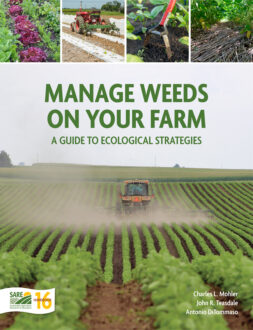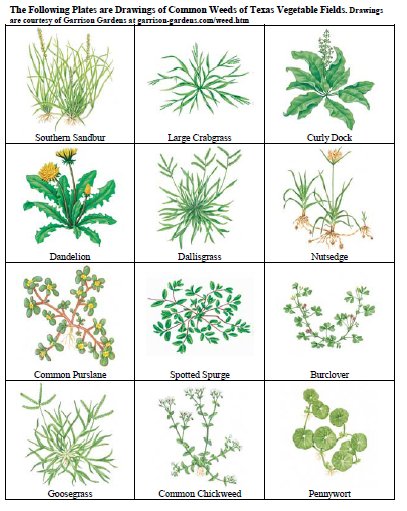As an Amazon Associate, I earn from qualifying purchases.
Common farm weeds include dandelions, thistles, and crabgrass. These weeds compete with crops for resources and reduce yields.
Farmers face significant challenges from common weeds. Dandelions, thistles, and crabgrass are some of the most prevalent invaders. These weeds compete aggressively with crops for sunlight, water, and nutrients. Effective weed management is essential to maintain crop health and productivity.
Understanding the types of weeds and their growth patterns helps farmers develop targeted control strategies. Organic and chemical methods can both be employed for weed control. Timely intervention prevents these weeds from spreading and causing extensive damage. By staying vigilant, farmers can protect their crops and ensure better yields.
Introduction To Common Farm Weeds
Weeds are unwanted plants in the farm. They compete with crops for nutrients, water, and sunlight. Farmers face challenges controlling weeds. Effective weed control is important for crop health. Weeds can spread quickly and harm the crops. Knowing common weeds helps in managing them better.
Weed control is essential for a healthy farm. Weeds can reduce crop yield significantly. They take away vital resources from crops. Proper weed management ensures crops grow well. It also helps in preventing diseases. Weeds can host pests and pathogens. Controlling weeds keeps the farm environment healthy.
Weeds impact crop yield negatively. They compete with crops for essential resources. Weeds can reduce the amount of water available to crops. They also take up nutrients from the soil. This affects the growth and health of crops. Poor weed control can lead to lower harvests. Farmers must manage weeds to ensure good crop yield.
Categories Of Farm Weeds
Farmers often battle common farm weeds like dandelions, crabgrass, and pigweed. These weeds can hinder crop growth and reduce yields. Effective weed management is crucial for maintaining healthy and productive farmland.
Annual Weeds
Annual weeds grow from seeds each year. They complete their life cycle in one season. These weeds can spread quickly. Examples include crabgrass, foxtail, and pigweed. Controlling them early is important. Using mulch can help prevent their growth. Removing them by hand is also effective.
Perennial Weeds
Perennial weeds live for many years. They can grow back from their roots. These weeds are harder to control. Examples include dandelions, thistles, and bindweed. Digging up the roots can help remove them. Using herbicides might be necessary for tough weeds. Regular monitoring is key to control.
Identifying Common Farm Weeds
Common farm weeds have unique physical features. Some weeds have broad leaves while others have narrow leaves. Many weeds have sharp thorns or spiky edges. A few weeds have bright flowers. Weeds often have deep roots. These roots make them hard to pull out.
Weeds grow quickly. They can spread over large areas. Some weeds grow in clumps while others spread evenly. Many weeds can choke crops by stealing water and nutrients. Weeds can survive in poor soil. They often grow back after being cut. Managing weeds is important for healthy crops.

Popular Annual Weeds
Dandelions, crabgrass, and pigweed rank among the most common farm weeds. These persistent invaders often compete with crops for nutrients and sunlight.
Common Ragweed
Common Ragweed is a widespread weed. It grows quickly in fields. This weed can produce a lot of seeds. Farmers often see it in late summer. It can cause allergic reactions in many people. The plant has small green flowers. They release pollen into the air. Controlling this weed is important for crop health.
Pigweed
Pigweed is another common farm weed. It can grow very tall. The leaves are green and oval-shaped. Pigweed competes with crops for nutrients. It can reduce the yield of many crops. This weed is tough and can survive in many conditions. Removing pigweed early is essential for farm management.
Common Perennial Weeds
Dandelions have bright yellow flowers and deep taproots. They spread quickly in fields and gardens. The seeds can float in the wind. Dandelions can be tough to remove because of their roots. Herbicides can help control them.
Quackgrass is a perennial weed with creeping rhizomes. It can take over fields rapidly. The roots can grow deep and wide. Tilling the soil can break up the roots. This helps control quackgrass. Herbicides can also be effective.
:max_bytes(150000):strip_icc()/pictures-of-weeds-4069715_final-a965e9da6f764ef7a71972bb1b5a02fd.png)
Effective Weed Management Strategies
Crop rotation helps prevent weed growth. Changing crops each season stops weeds from adapting. Cover crops like clover can block weeds. These plants cover the soil and stop weeds from growing. Proper spacing of plants is important. Plants too close together can help weeds spread.
Hand weeding is simple and effective. Pull weeds by hand to keep fields clean. Tillage turns the soil and buries weeds. This method kills young weeds. Mulching covers the soil with materials like straw. Mulch stops light from reaching weed seeds.
Chemical Weed Control Methods
Herbicides are chemicals used to kill weeds. There are different types of herbicides. Selective herbicides target specific weeds. Non-selective herbicides kill all plants they touch. Pre-emergent herbicides prevent weed seeds from growing. Post-emergent herbicides kill weeds after they have sprouted. Each type has its own use and benefits.
Applying herbicides correctly is very important. Spraying is a common method. You can use a hand-held sprayer for small areas. Large areas might need a tractor-mounted sprayer. Always follow the instructions on the herbicide label. Make sure to wear protective clothing. This keeps you safe from chemicals. Be careful not to spray on windy days. The wind can carry the herbicide to other plants.
Organic Weed Control Solutions
Natural herbicides help control weeds without harming the environment. Vinegar is a common natural herbicide. It can kill weeds quickly. Salt is another option. It dehydrates the weeds and stops their growth. Corn gluten meal can prevent weed seeds from sprouting. Always use these natural herbicides carefully. They can affect other plants too.
Mulching helps keep weeds away. It covers the soil and blocks sunlight. Without sunlight, weeds cannot grow. Organic mulches like straw and leaves are best. They also improve soil health. Cover crops are plants grown to cover the soil. They crowd out weeds and add nutrients to the soil. Popular cover crops include clover and rye. They are easy to plant and maintain. Always remove cover crops before planting main crops.
Preventive Measures
Implementing preventive measures helps control common farm weeds effectively. Regular monitoring and timely herbicide application ensure a healthy crop yield.
Crop Rotation
Crop rotation is a great way to control weeds. Different crops need different nutrients. Rotating crops can disrupt the life cycle of weeds. This makes it hard for weeds to grow and spread. Farmers often use this method to keep their fields healthy. It also helps improve soil quality.
Proper Field Maintenance
Proper field maintenance includes many activities. Regular weeding is one of them. Removing weeds early stops them from spreading. Mowing and tilling can also help. Both methods keep the weed population low. Farmers should also check their fields often. Catching weeds early makes control easier. Healthy fields have fewer weed problems.

Frequently Asked Questions
What Are Common Farm Weeds?
Common farm weeds include dandelions, thistles, crabgrass, pigweed, and ragweed. These weeds can compete with crops for nutrients, water, and sunlight.
How Can You Identify Farm Weeds?
Identify farm weeds by their leaf shapes, growth patterns, and flowering characteristics. Use a weed identification guide for accurate recognition.
Why Are Farm Weeds Problematic?
Farm weeds are problematic because they compete with crops for essential resources. They can reduce crop yields and quality.
What Are Natural Ways To Control Farm Weeds?
Natural ways to control farm weeds include mulching, crop rotation, and manual removal. These methods help reduce weed growth without chemicals.
Conclusion
Managing farm weeds requires knowledge and persistence. Identifying common weeds helps in controlling them effectively. Regular monitoring and proper techniques ensure a healthy farm. Stay informed and proactive to protect your crops. A weed-free farm promotes better yields and sustainability.

